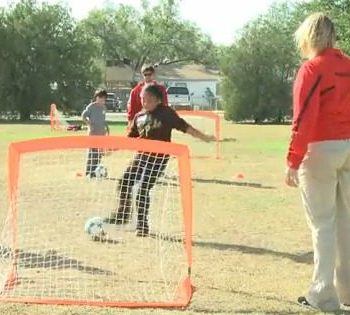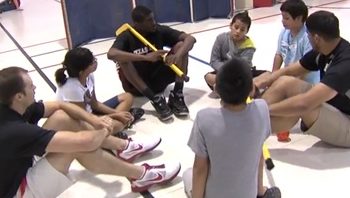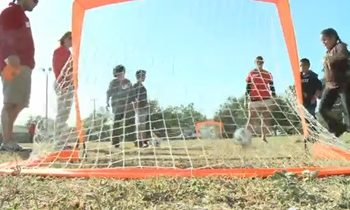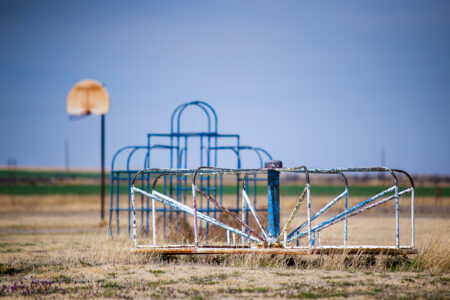
Share On Social!
A group of Texas Tech University students wanted to get some hands-on coaching experience. Jeff Key, an instructor at Texas Tech, worked to give the students in-class instruction and an opportunity to coach/teach and do community service at the same time—a unique effort that resulted in the development of after-school fitness and mentoring programming at McWhorter Elementary School in Lubbock, Texas.
Emergence
Awareness: Jeff Key, an instructor and coordinator of community outreach for the Department of Health, Exercise Science, and Sport Sciences at Texas Tech University (TTU), knew that obesity was a problem among the community. He was especially concerned with how it was affecting younger generations.
“We were concerned that almost 35% of elementary kids were overweight or obese before 5th grade,” Key said.
Key had previously worked as an adapted physical education teacher with the Lubbock Independent School district (Lubbock ISD) and had observed the need for improved physical activity standards offered to students during afterschool programming.
Learn/ Frame Issue: Key, a TTU instructor since 2008, wanted his undergraduate kinesiology students to have opportunities in coaching children but he was also interested in having them address some of the community’s most basic needs.
He wanted to accomplish this through “service learning.”
Service learning is a “teaching and learning strategy that integrates meaningful community service with instruction and reflection to enrich the learning experience, teach civic responsibility, and strengthen communities,” according to the National Service–Learning Clearinghouse (NSLC).
“Through service-learning, young people—from kindergarteners to college students—use what they learn in the classroom to solve real-life problems,” the NSLC website states. “They not only learn the practical applications of their studies, they become actively contributing citizens and community members through the service.”
Key said TTU had used a service-learning framework for its Fun & Fit program, in which TTU students worked with children to teach healthy eating and exercise at the TTU campus.
Key wanted something at local schools, rather than at TTU.
He partnered with Marc Lochbaum, a professor of the Department of Health, Exercise Science and Sport Sciences at TTU, to develop a new curriculum to have TTU students teach elementary students various physical activities after school and mentor them about being a good citizen.
Key and Lochbaum wanted to offer something that was more structured than existing afterschool programs, and wanted Tech students to work with economically disadvantaged children, who are typically less likely to be involved in afterschool activities.
“We wanted to put a professional touch to afterschool programs.” Key said. “We just wanted to be able to control the quality piece.”
Key envisioned working with Lubbock ISD schools because TTU had an existing professional development school partnership with the district. Also, having formerly taught at Lubbock ISD, Key had established working relationships with some of the district’s elementary school principals and P.E. coaches, so he felt he would be able to foster their support for bringing the new program.
“A lot of times if the principal trusts you, they will let you in,” Key said.
Key wanted to focus on one Lubbock ISD school, McWhorter Elementary, because he said the school’s students were mostly minority, and minority children are at higher risk for becoming obese. The Texas Tribune reports that 92.7% of McWhorter students are economically disadvantaged and 91.2% are Latino.
DEVELOPMENT
Education: Key first pitched the idea for a new afterschool program to the then-principal at McWhorter Elementary, Luis Cardenas.
Key explained that developing an afterschool fitness and mentoring program would contribute to the learning of both McWhorter elementary and Texas Tech students. McWhorter students would have the opportunity to receive structured physical activity as well as learn valuable lessons that would help mold their character.
“Having a role model makes a difference to these kids,” Key said. “These kids see young coaches and think, ‘This guy is like me. Maybe I can do that. Maybe I can go to college.’”

According to Key, Cardenas’ response was: “Anything to enhance the physical activity of the students…Yeah you can use our outdoor space, and when it gets cold you can use the gym.”
Cardenas agreed to host the program at McWhorter.
Mobilization: Key started working with graduate students to develop what they would call the Active Character program.
“At first, I went to the Internet and I looked for information on trust and respect,” Key said.
Key let his student coaches take lead in developing the Active Character curriculum to his students. At the end of the semester, students would spend 2 weeks in a computer lab and look for information related to topics that would help build great character. New information was added to existing information.
“It was really just thinking about the program being structured and not rigid,” Key said.
Debate: Student coaches discussed different ways to deliver the Active Character program, including setting up timed stations to keep kids moving and attentive.
“If you do any activity for more than 15 minutes, you’re likely to get bored,” Key said.
Another thought was that the students should stay with the same teammates and coaches for the entire semester, so that they could develop a sense of belonging to a group.
“If a person feels like they’re part of a team it spurs them on to be a better citizen,” Key said. “That’s why we decided to keep the teams together.”
ENACTMENT

Activation: Key, student coaches, and graduate research assistants got busy preparing to launch the Active Character program at McWhorter.
They needed some basic sporting equipment.
Fortunately, the chair of the Health, Exercise Science, and Sport Sciences department gave them $2,000 to buy equipment to launch the Active Character Program at McWhorter. With these funds they purchased hockey sticks, soccer balls, and soccer goals.
“With just a little seed money we got started,” Key said. “We already had the resources [manpower] because we had about 15-20 students signing up for the Principles of Teaching Skill Themes & Movement Concepts class.”
Meanwhile, Cardenas and the P.E. teacher at McWhorter got the word out to parents about the Active Character program by making announcements and handing out information sheets.
At the beginning of the Fall semester, Key met with the student coaches for about six different class periods and taught them about classroom management, how to prepare a physical education lesson, and other best practices in the physical activity setting.
Frame Policy: The program would be offered to 4th- and 5th-grade students twice a week on Tuesdays and Thursdays at McWhorter. For each day of the program, there would be a theme (i.e., hockey, soccer, lacrosse) with about five to six different activities.
The Active Character program wouldn’t just teach basic skills in sports, but it would also offer a lesson on topics like trust, community, and respect. For each character theme, the student coaches would give the elementary students a key definition, and ask them a set of related questions. The mentors would share a popular thematic story, then a personal story. After hearing from the coaches, students would share their own thoughts and soon return to physical activity for the remainder of the session.
Change: In fall 2011, 50 4th- and 5th-graders at McWhorter signed up for the Active Character program.
Enrolled students participated from 3:30 to 5 p.m. on Tuesdays and Thursdays.
Activities took place outside at the school’s field on most days and at the school’s gym on inclement weather days. Students did 45 minutes of physical activity, 10 minutes of character development, then activity again for the remainder.
Heather White was one of the TTU teaching assistants in charge of implementing the Active Character program.
“One of the big improvements we’ve made was with the character talks,” White said. “We’ve really developed that part of it. For instance we’ll use games like tug-of-war to show team work…or if a kid is hogging the ball then we would ask, ‘How would you use teamwork in this situation?’ and then they share the ball with their teammates.”
In a Texas Tech public broadcasting (KTTZ-TV) report, one parent spoke of how the Active Character program helped her daughter make new friends. Cardenas also noticed positive changes in the behavior of students participating in the Active Character program.
IMPLEMENTATION
Implementation: On average 40 students currently attend the Active Character program at McWhorter Elementary. Students are divided up into teams of about 10-12 and are paired with two student coaches from Key’s Principles of Teaching Skill Themes & Movement Concepts class. Coaches were paired based on personality tests they took in Key’s class.

Key said: “We wanted to mix the coaches up so that someone who was more outgoing would be paired with someone who was a bit more reserved.”
The teams stay together for 90 minutes and rotated through different drills like soccer dribbling, passing, and shooting, every 15 minutes. One component that was later added to the Active Character program was 2-minute breaks to raise students’ heart rates. For instance, while switching stations, students participated in something like a relay race.
“What we are targeting are those kids who are non-athletes,” Key said. “We wanted to target those kids that just go home and watch TV, we wanted to make it low-competitive and very active.”
Equity: A recent U.S. Education Promise Neighborhood grant allowed Texas Tech students to continue expanding the Active Character and other service-learning programs into other schools, such as Harwell Elementary, another low-income, predominantly Latino school in Lubbock ISD. Harwell is located in the historically disadvantaged East Lubbock Promise Neighborhood (ELPN).
“We wanted to get more kids involved,” Key said. “That came with the grant to hire teaching assistants (TAs) to help instructors.”
With funding from the Promise Neighborhood Grant, four TAs were brought on board to deliver Fun & Fit, an evidence-based service-learning program previously developed by TTU researchers to engage minority students in physical activity and nutrition education, to Harwell students.
Key once again looked to his network of contacts and approached Harwell’s principal Mr. Severo Alvarado, to bring service-learning based physical activity to students at Harwell.
“I showed him the video of McWhorter,” Key said. “I told him we wanted to something similar here and then he said, ‘OK let’s try.’”
“A lot of them [the kids] look forward to the program. They love the open space and the chance to run around, and play games,” White said. “It’s all smiles with them.”
Key and his team of coaches in training also expanded into a third neighborhood where they worked with a private ministry to deliver an afterschool program. Now they plan on moving the program to a school located in the same area, because they’ve found that students respond better to the program when offered in a school-based setting.
Through the Promise Neighborhood Grant, Key and the TTU team have done more than fitness, too. They’ve also been able to offer ELPN children a meal provided through a partnership with the Food Bank.
While the team would like to continue expanding, it would be difficult for Tech to take on this challenge alone.
“We only have the capacity to be at some schools,” said Key.
Sustainability: Although Cardenas isn’t at McWhorter Elementary anymore, the Active Character program now is in its third year under Delmira Lopez, McWhorter’s new principal, who has continued the relationship with TTU.
Key said: “I made a point to speak with her [Ms. Lopez] and asked if we could continue, to make sure she was on board. By then we had built enough of a reputation that she had no problem.”
Although Active Character is grant funded, the success of the programs, the relationships that Key and students have fostered with local schools and students, and the Professional Development School partnership between TTU and Lubbock ISD, will continue allowing for the program, Key said.
Additionally, students taking sports marketing classes at TTU arranged an end-of-year fitness celebration at McWhorter, which will be open to the whole school and to parents. In the future, Key has thought about collecting data on student behavior and fitness from the Public Education Information Management System (PIEMS) and school Fitnessgram reports to provide empirical evidence of the success of the program.
Additional Links:
Service Learning at Texas Tech University
The East Lubbock Promise Neighborhood Grant
Service-Learning: A Venue for Enhancing Pre-Service Educators’ Knowledge Base for Teaching
Keeping it Local: Active Character Video
Active Character Video
This success story was produced by Salud America! with support from the Robert Wood Johnson Foundation. The stories are intended for educational and informative purposes. References to specific policymakers, individuals, schools, policies, or companies have been included solely to advance these purposes and do not constitute an endorsement, sponsorship, or recommendation. Stories are based on and told by real community members and are the opinions and views of the individuals whose stories are told. Organization and activities described were not supported by Salud America! or the Robert Wood Johnson Foundation and do not necessarily represent the views of Salud America! or the Robert Wood Johnson Foundation.
By The Numbers
33
percent
of Latinos live within walking distance (<1 mile) of a park
This success story was produced by Salud America! with support from the Robert Wood Johnson Foundation.
The stories are intended for educational and informative purposes. References to specific policymakers, individuals, schools, policies, or companies have been included solely to advance these purposes and do not constitute an endorsement, sponsorship, or recommendation. Stories are based on and told by real community members and are the opinions and views of the individuals whose stories are told. Organization and activities described were not supported by Salud America! or the Robert Wood Johnson Foundation and do not necessarily represent the views of Salud America! or the Robert Wood Johnson Foundation.



